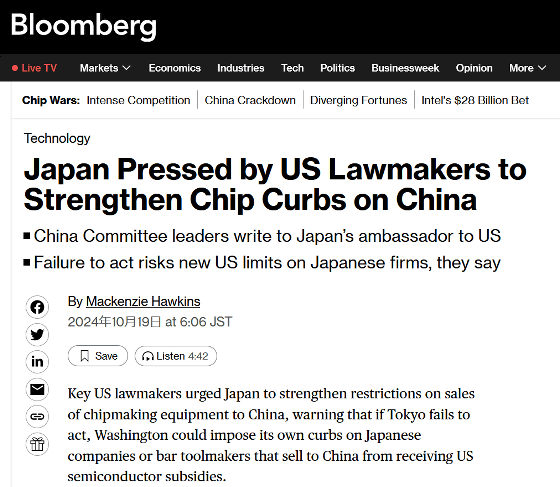U.S. lawmakers are pressuring Japan to 'tighten export controls on semiconductor manufacturing equipment to China'

The United States, which is deepening its economic and political conflict with China, is strengthening export controls on semiconductors and semiconductor manufacturing equipment to curb China's AI development. The economic newspaper Bloomberg reported that the US House of Representatives Special Committee on China sent
Japan Pressed by US Lawmakers to Strengthen Chip Curbs on China - Bloomberg
https://www.bloomberg.com/news/articles/2024-10-18/japan-pressed-by-us-lawmakers-to-strengthen-chip-curbs-on-china

The U.S. government is concerned that the Chinese government's military use of AI poses a threat to national security, and has strengthened export controls on semiconductors, semiconductor manufacturing equipment and technology to China and called on its allies to do the same.
In particular, strong pressure has been exerted on Japan, where the major semiconductor manufacturing equipment maker Tokyo Electron is headquartered, and the Netherlands, where ASML is based, which has a monopoly on semiconductor lithography technology. However, because China is an important trading partner for these semiconductor manufacturing equipment makers, there is also strong opposition to the export restrictions, which are seen as damaging to the profits of these companies.
Republican Rep. John Moolenaar, chairman of the Select Committee on China, and Rep. Raja Krishnamoorthi, the committee's top Democrat, denied the claim that export restrictions have a negative impact on companies, saying, 'We do not believe that this claim stands up to scrutiny,' in a letter sent to Ambassador Yamada on October 15. They urged Japan to not take action, saying the U.S. could impose its own restrictions on Japanese companies or block manufacturers doing business with China from receiving U.S. semiconductor subsidies.

The letter cites as evidence to the contrary the stock prices of semiconductor manufacturing equipment manufacturers such as Tokyo Electron, ASML, Lam Research , and Applied Materials have risen over the past few years, and that semiconductor subsidy systems in the United States and the EU benefit manufacturers.
Bloomberg said, 'These companies are generally benefiting from the artificial intelligence boom. So far they haven't received any direct subsidies from the US CHIPS Act , but their customers, semiconductor makers like Intel and Samsung, can take advantage of a 25% tax credit to buy equipment for their American facilities.'
Because China is a key customer for all semiconductor equipment makers, authorities in Japan and the Netherlands are cautious about imposing further export controls, while American companies say their export controls give foreign competitors an unfair advantage and that they will unilaterally damage American industry unless their allies do the same.
Of course, Chinese authorities are also showing signs of resisting the semiconductor restrictions led by the US. According to information obtained by Bloomberg from anonymous sources, a senior Chinese official met with his Japanese counterpart and stated that China will take severe economic retaliatory measures against Japan if Japan further restricts sales of semiconductor manufacturing equipment to Chinese companies. This may also include export restrictions on minerals necessary for automobile manufacturing.
China threatens Japan with economic retaliation if it restricts exports of semiconductor manufacturing equipment - GIGAZINE
The letter to Ambassador Yamada also mentioned the possibility that China might increase its domestic non-cutting-edge semiconductor manufacturing capabilities. Moolenaa, Krishnamoorthi and others argued that multilateral cooperation is important to mitigate the threat from China, and also emphasized the existence of the Foreign Direct Product Rules (FDPR) , which restrict the export of semiconductor manufacturing equipment that uses some American technology or software.
Related Posts:
in Note, Posted by log1h_ik






